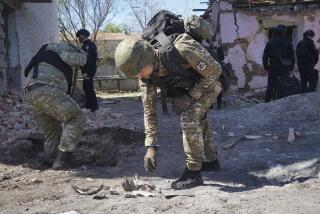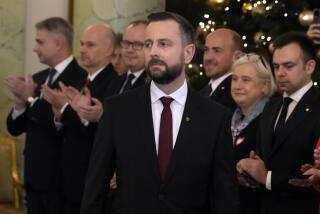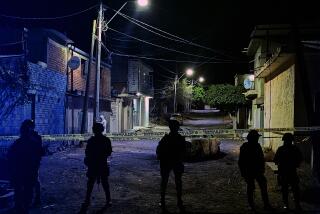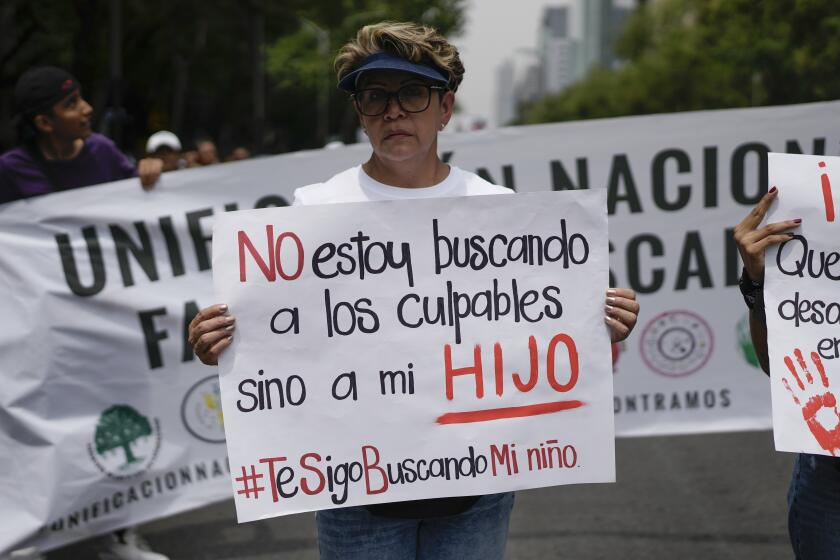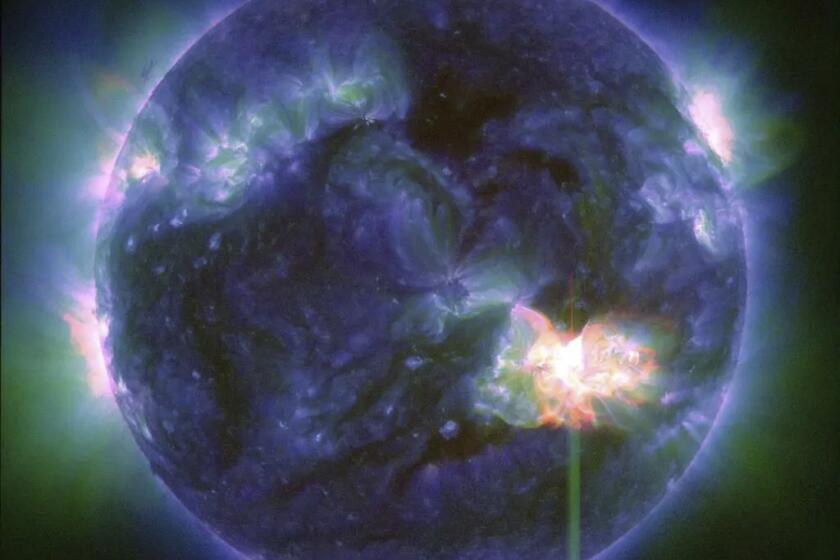New Round of Sparring Begins for Israeli Rivals
Sometimes it’s a partnership, and sometimes it’s a punch-up. For “Arik” and “Bibi,” it appears that the sparring has begun anew.
Israeli Prime Minister Ariel Sharon, in a surprise move, ousted longtime rival Benjamin Netanyahu as foreign minister Wednesday as he put the final touches on his new governing coalition that is to be sworn in today.
Netanyahu was offered an opportunity to remain in the Cabinet as finance minister -- a job he had previously insisted he would not accept, and initially turned down when Sharon offered it.
By early today, Israeli media were reporting his grudging acceptance. The Finance Ministry job is a senior governmental post but is considered something of a poisoned chalice these days as Israel weathers its worst economic downturn in decades. And it carries nowhere near the clout, visibility and international prestige as the foreign minister’s job, which Netanyahu has held since November.
Also Wednesday, Sharon added a second far-right-wing party to his parliamentary coalition -- a move that gives him a more comfortable 68-seat majority in the 120-member Knesset, or parliament, but even less leeway in any moves toward a peace settlement with the Palestinians.
Political Spectacle
Sharon and Netanyahu, the country’s two most prominent and popular conservative politicians, have devoted years of their public lives to a rivalry that many Israelis, regardless of their political stripe, have come to relish as a spectator sport.
Nominally, the two are allies. They have served in each other’s governments, and within their Likud Party they share a broad affinity on key issues, including a common hard line toward the Palestinians. In the past, they have occasionally helped each other out of tough spots.
But they have also repeatedly seized opportunities to humiliate each other. In 1996, when Netanyahu became prime minister, he ignored Sharon’s highly public plea for a senior government post and relegated him to minister of infrastructure. Sharon eventually became Netanyahu’s foreign minister, but not until two years later.
A generation apart -- Sharon turned 75 on Wednesday, while Netanyahu is 53 -- the two have dramatically differing political styles.
As he did during his military career, Sharon the politician tends to rely on blunt force rather than tactical finesse, while the U.S.-educated Netanyahu possesses a smooth-talking, telegenic flair unmatched in Israeli politics.
Although the two might appear to have little in common, Israeli pundits like to theorize that the political careers of both men are driven by pivotal events in their pasts -- Netanyahu’s by the death of his idolized older brother, Yonatan, as he led the famed 1976 Israeli commando raid in Entebbe, Uganda, to rescue a planeload of hijacked Israelis.
Within the Netanyahu family, Yonatan, the eldest son, had been groomed for leadership. It was only after his death that Benjamin abandoned a business career in the United States, dropped the shortened last name he had been using -- Nitay -- and returned to Israel to claim the family birthright and enter politics.
Sharon, for his part, spent a decade and a half in political exile over his role in Israel’s war in Lebanon, having been found indirectly responsible for the 1982 massacre of Palestinian refugees at the Sabra and Shatila camps by Christian militias allied with the Jewish state. Now that he has won the overwhelming public mandate he craved, he is seen as wanting to leave his historical mark while there is time.
But the widely held belief that Sharon hoped to join the warrior-turned-peacemaker tradition of Israeli politicians such as Menachem Begin and Yitzhak Rabin has been thrown into doubt by the unyieldingly right-wing nature of the new government he has assembled.
Two of the four parties in the coalition -- the National Religious Party and the National Union, which is actually a bloc of three smaller parties -- take positions on the Palestinian question that are far more sharp-edged than Sharon’s.
The National Religious Party, the prime backer of the Jewish settlement movement in the West Bank and Gaza Strip, is adamantly opposed to any territorial concessions to the Palestinians, whatever the circumstances. The National Union advocates the negotiated “transfer” -- the expulsion, critics say -- of Palestinians to other Arab countries. Both vehemently oppose Palestinian statehood.
Coveted Portfolio
Netanyahu had served as caretaker foreign minister since the Labor Party pulled out of Sharon’s coalition last fall, precipitating January’s early elections. From the beginning, he had made it clear that the Foreign Ministry was the only job he wanted in the new government.
But Sharon, at the last moment, handed the crucial post to foreign-affairs neophyte Silvan Shalom, a close ally who analysts said will probably do exactly what the prime minister tells him -- as opposed to the sometimes independent-minded Netanyahu.
Netanyahu was then offered the job that Shalom was considered to have performed too poorly to keep -- finance minister.
In a prospective war with Iraq, Netanyahu might have been looking forward to reprising what may have been his most successful turn on the world stage -- as Israel’s chief spokesman during the 1991 Persian Gulf War. At one point, during a live interview with CNN while a Scud missile alert was in progress, he slipped on his gas mask and continued answering questions with aplomb.
Amid the political wrangling, however, there was an unexpected respite to on-the-ground violence. Israel and the West Bank were blanketed with snow Tuesday and Wednesday, nearly shutting down activities in both -- including fighting.
A youth was killed Tuesday in the southern Gaza Strip, where no snow fell and clashes continued, and an elderly Palestinian from the West Bank died Wednesday of wounds suffered earlier.
“These two days could almost make you believe there had been some kind of breakthrough -- see how quiet it is!” Rashid Issa, a Palestinian man in his 30s, said as he took a stroll Wednesday in front of the snow-covered Church of the Nativity in Bethlehem.
“But I am afraid it will all disappear as soon as the snow melts.”
More to Read
Start your day right
Sign up for Essential California for news, features and recommendations from the L.A. Times and beyond in your inbox six days a week.
You may occasionally receive promotional content from the Los Angeles Times.
